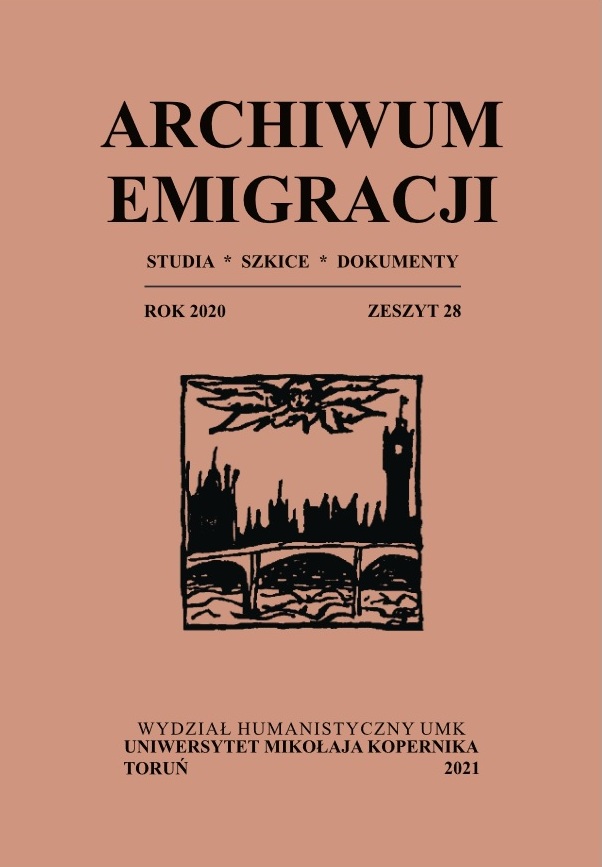Modern Literary Exile. The Ones Who Leave: Nabokov, Brodsky, Aciman
DOI:
https://doi.org/10.12775/AE.2020.014Keywords
exile, involuntary memory, native city, nostalgia, 20th century, wygnanie, pamięć mimowolna, miasto rodzinne nostalgia, XX wiekAbstract
MODERN LITERARY EXILE THE ONES WHO LEAVE: NABOKOV, BRODSKY, ACIMAN
Before the culture of constant travel and movement characterising the 21st century, there was the exile of the 20th century, a century defined, according to Joseph Brodsky, by “displacement and misplacement.” The Russian author is one of the primary writers whose works are analysed in this paper, with the other two being Vladimir Nabokov and André Aciman. The lives and works of those three authors are connected by the common thread of exile, along with the symptoms of the condition: the unbreakable connection between individual and the native city, the regaining of the past through the process of remembering, the “attacks” of involuntary memory, the suspended life between past and present, and using art as the supplement of a fragmented life but also as its compensation. Brodsky and Nabokov, who never returned to their homelands, lean toward a less direct but, for that very reason, more powerful expression of their sense of displacement and love of their common city of origin, St. Petersburg. Aciman, the youngest and the only living one of the trio, holds a more contemporary attitude to exile. While openly expressive of his nostalgia in a way that the other two resist, the emotion in Aciman acquires a more theoretical nature. Because he eventually revisits Alexandria, his native city, Aciman gains a clarity that the other authors lack, one informed by the completion of the exilic cycle. The numerous commonalities and fewer differences of the three authors shed significant light on the condition that has become commonplace in the contemporary world.
WSPÓŁCZESNE LITERACKIE WYGNANIE. CI, KTÓRZY WYJECHALI: NABOKOW, BRODSKI, ACIMAN
Przed kulturą ciągłej podróży i ruchu charakteryzującą XXI wiek było wygnanie XX wieku definiowanego przez Josepha Brodskiego jako wiek „wysiedlenia i zawieruszenia”. Ten rosyjski autor jest jednym z trzech, których dzieła zostały poddane analizie w tym artykule — pozostali to Władimir Nabokow i André Aciman. Życia i dzieła tychże autorów łączy nić wygnania i jego symptomy: nierozerwalna więź pomiędzy jednostką a miastem rodzinnym, odzyskiwanie przeszłości poprzez pamiętanie, „napady” wspomnień, stan zawieszenia pomiędzy przeszłością i teraźniejszością i używanie sztuki nie tylko jako formy zastąpienia, ale również jako kompensacji utraconego życia. Brodski i Nabokow, którzy nigdy nie wrócili do ojczyzny, opisują swoje poczucie wysiedlenia i miłość do swojego rodzinnego miasta, Petersburga, w sposób mniej dosadny, ale o wiele bardziej emocjonalny. Z kolei Aciman, najmłodszy z całej trójki, prezentuje o wiele bardziej współczesne podejście do wygnania. Chociaż mówi o swojej nostalgii w sposób bardziej otwarty niż Brodski i Nabokow, emocje przez niego wyrażane wydają się mieć naturę teoretyczną. Jako że Aciman wraca wreszcie do swojego miasta rodzinnego, Aleksandrii, daje mu to lepszy wgląd w zrozumienie wygnania i emocji, które ono wywołuje. Podobieństwo doświadczeń trzech autorów rzuca światło na doświadczenie, które stało się codziennością współczesnego świata.
References
Aciman, André. False Papers. New York: Farrar, Straus & Giroux, 2000.
Aciman, André. Out of Egypt. New York: Riverhead Books, 1996.
Baudelaire, Charles. Les Fleurs du Mal et Oeuvres Choises, ed. end transl. Wallace Fowlie. New York: Dover, 1992.
Boym, Svetlana. The Future of Nostalgia. New York: Basic books, 2001.
Brodsky, Joseph. Watermark. New York: Farrar, Straus & Giroux, 1992.
Brodsky, Joseph. On Grief and Reason. New York: Farrar, Straus & Giroux, 1995.
Brodsky, Joseph. Less than One. New York: Farrar, Straus & Giroux, 1986.
Foster, John Burt. Nabokov’s Art of Memory and European Modernism. New Jersey: Princeton University Press, 1993.
Gombrowicz, Witold. Diary, Volume One, ed. Jan Kott, transl. Lillian Vallee. Illinois: Northwestern UP, 1988.
Jerzak, Katarzyna. “Modern Exile and Perspective in Baudelaire’s ‘Le cygne’ and in pittura metafisica,” unpublished paper.
Jerzak, Katarzyna. “Exile as Life after Death in the Writings of Henryk Grynberg and Norman Manea.” The Writer Uprooted: Contemporary Jewish Exile Literature, ed. Alvin H. Rosenfeld, 75–91. Bloomington: Indiana UP, 2008.
Jerzak, Katarzyna. “Life in Translation: Exile in the Autobiographical Works of Kazimierz Brandys and Andrzej Bobkowski.” Exile as the Home of the 20th Century, ed. John Neubauer. Berlin: de Gruyter, forthcoming.
Khrushcheva, Nina L. Imagining Nabokov: Russia between Art and Politics. New Haven & London: Yale UP, 2007.
Lane, Anthony. ‘“Call Me By Your Name”: An Erotic Triumph.’ The New Yorker. December 4, 2017 issue. https://www.newyorker.com/magazine/2017/12/04/call-me-by-your-name-an-erotic-triumph. Accessed December 5, 2019.
Nabokov, Vladimir. The Gift, transl. Michael Scammell. New York: Vintage, 1991.
Nabokov, Vladimir. Speak, Memory: An Autobiography Revisited. New York: Vintage, 1989.
Nabokov, Vladimir. Strong Opinions. New York: Vintage, 1990.
Píchová, Haná. The Art of Memory in Exile: Vladimir Nabokov & Milan Kundera. Illinois: Southern Illinois University Press, 2002.
Rubin Suleiman, Susan, ed. Exile and Creativity: Signposts, Travelers, Outsiders, Backward Glances. Durham and London: Duke U P, 1998.
Said, Edward W. Out of Place. New York: Vintage-Random House, 2000.
Said, Edward W. Reflections on Exile and Other Essays. Cambridge: Harvard UP, 2000.
Turoma, Sanna. Brodsky Abroad: Empire, Tourism, Nostalgia. Madison: University of Wisconsin Press, 2010.
Weir, Keziah. “Find Me Author André Aciman Talks Eternal Youth, a Hollywood Sequel, and That Peach Scene.” Vanity Fair, October 31, 2019.
https://www.vanityfair.com/style/ 2019/10/find-me-andre-aciman-new-book-interview. Accessed December 7, 2019.
Downloads
Published
How to Cite
Issue
Section
Stats
Number of views and downloads: 1140
Number of citations: 0



